What is The Point of Diminishing Returns with Blog Word Count?

The word count of a blog post is a contentious topic. There are nearly as many different perspectives on it as there are companies writing blog posts in the first place. Some people write 1,000-word posts and do just fine. Others write 3,000-word posts and struggle to get even a top-10 ranking. Moreover, many different marketing firms have performed studies on the subject.
I've talked to companies who think that the only way to rank is to produce progressively longer and more detailed pieces of content. People who think that the only way they can compete is by writing blog posts that are 5,000, 8,000, or even 10,000-words long.
I don't think that's a worthwhile endeavor, at least for most of your blog posts, and I'll tell you why.
 30 Second Summary
30 Second Summary
You don't need to obsess over hitting a specific word count for your blog posts. While the average post length has grown to around 1,300-1,400 words your target length should depend on your competition. You'll typically do well with 2,000 words but you have to match what top-ranking posts in your niche are doing. Focus on creating high-quality, valuable content rather than just hitting word counts - your post length needs to fit the topic and outperform competitors in your space.
Word Count Studies
First, let's look at some details about word count as studied by marketing firms. There are a few I'd like to point to.
First up, let's take a look at the case study that I created on this topic last year: How many words is the average blog post?
In this study, I scraped data for almost 30,000 blog posts currently published on the web between 2011 and 2019. The results were roughly what I expected; the average length of a blog post has been going up year over year, with the most popular length range around 1,100 in the 2011-2015 range, and closer to 1,300 in 2019. I expect that if I scraped blog posts for 2020 to compare, we'd see the trend continue, with a word count edging closer to 1,400.
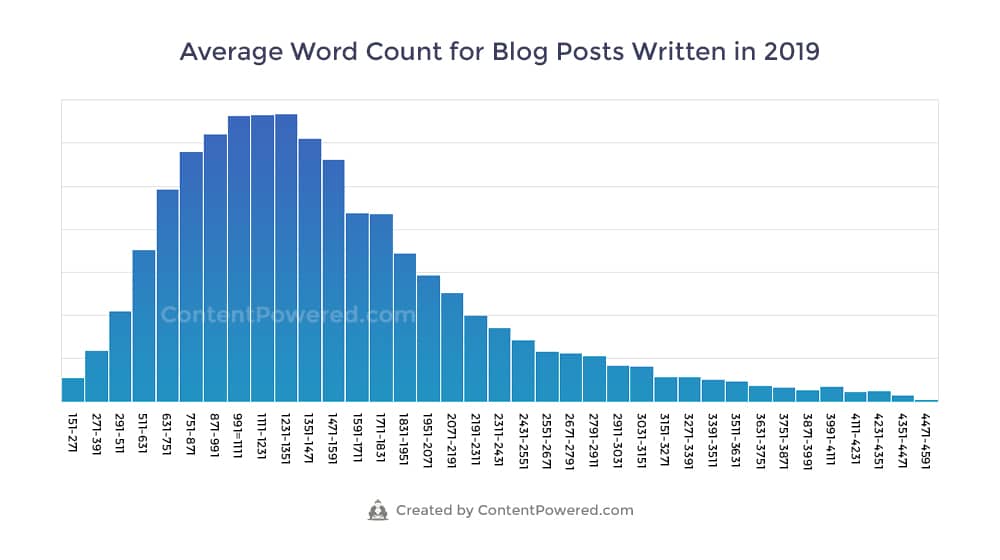
This is, however, an average. It doesn't give you data about how valuable those posts are, or if there's a point of diminishing returns in value. It just gives us an idea of what the average is out there.
Next, let's look at what Backlinko has to say. They analyzed way more posts than I did, over 900 million of them, and came to a range of different conclusions. "We analyzed 912 million blog posts. Here's what we learned about content marketing."
Here's what they learned:
- Long-form content gets more backlinks than short content.
- Long-form content gets more social shares than short content.
- Social shares experience diminishing returns at word counts over 2,000.
- There's no correlation between social shares and backlinks; one does not lead to the other.
The diminishing returns here is specifically about social shares. It seems that social media users don't give any significant preference to blog post length above and beyond 2,000 words worth of content. Conversely, longer content does tend to attract more backlinks.
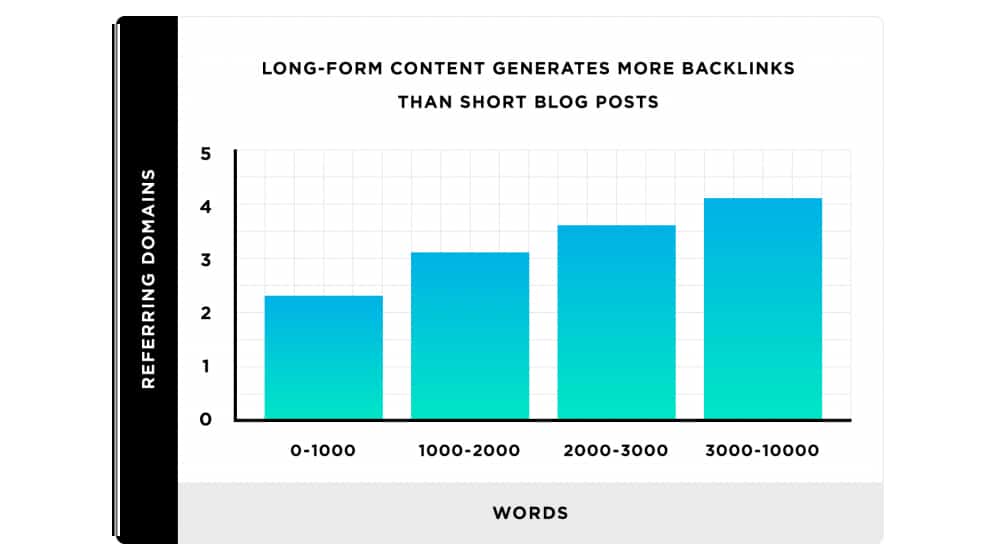
That said, they also found that 94% of all content gets zero backlinks, so that can throw a bit of a wrench into the works.
Another data point we can reference is Moz. Specifically, a writer on Moz discussed the topic back in 2018. They started with a study by Ryan Purthill, which indicates that the "magic number" for a blog post word count is 1,125.
The study in question was performed by starting with a very short article and adding 100 words of content at a time. Each additional batch of words increased the user "time on site" by a significant duration – ten seconds each – until they hit 1,125. At that point, the addition of more content did not increase the time spent on site by nearly as much.
Of course, this was also a five-year-old study, so the data isn't necessarily very relevant to us today.
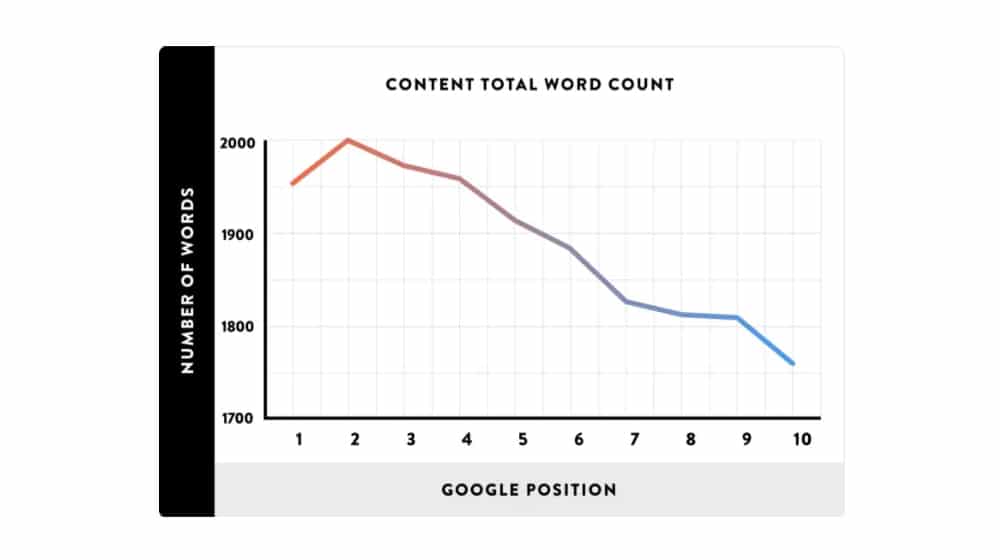
Another study, from BKA Content, indicates that the best word count for Google ranking is about 2,225. It's a more recent study, and they did it by comparing word count to Google ranking. They also extended the data and found that word count didn't matter all that much if you're not listed on the top 20 Google search results. Of course, given what we know of how much traffic anything other than the top result gets, that doesn't matter too much.
Another study, from BuzzSumo, analyzed over 100 million blog posts and determined that word counts over 2,000 were the best.
The Chicken and The Egg
What you have here is a bit of a chicken and egg problem, with the studies and the data I listed above. They can tell you the results of word count and how content performs. What they can't tell you is which is more important.
The chicken and the egg problem is a thought experiment. Something evolved into a chicken. It was a very chicken-like bird, but it wasn't anything like the chickens that we have today. So which came first; the chicken or the egg? Did the very first chicken hatch from an egg of a not-quite-chicken? Or did a not-quite-chicken lay the first chicken egg?

We have that problem here. Does the content perform well because of the word count, or is the word count influenced by other factors and simply fits based on the performance of the content?
Longer content can be great, and rank well. We see it all the time, with longer case studies and posts by big-name bloggers. Half the studies I linked up above were in the top few positions of Google results, and they have more than 2,000 words in them.
At the same time, we all know sites that rank #1 constantly and have content under 1,000 words long. Would those sites perform even better if they doubled their word count? Who knows! How can they even get better than #1? Well, that's sort of my point with this article.
Of course, there are a million examples of blogs with sub-1,000-word blog posts doing terribly, and examples of 5,000-word blog posts that never get a backlink. It's almost like there's more to the story than just the length of the content.
What I've seen in my experience is that the word count of the posts you write is only part of the story. The other part is the relative authority of your site and the sites of your competitors.
Consider two different topics. On one hand, you have a blog and you want to write a post about "miniature freshwater solar aquarium pumps". It's not a very competitive topic, and there's not much out there written on the subject. You have your usual product listings on Amazon and so forth, but in terms of blog content, there's not a lot.
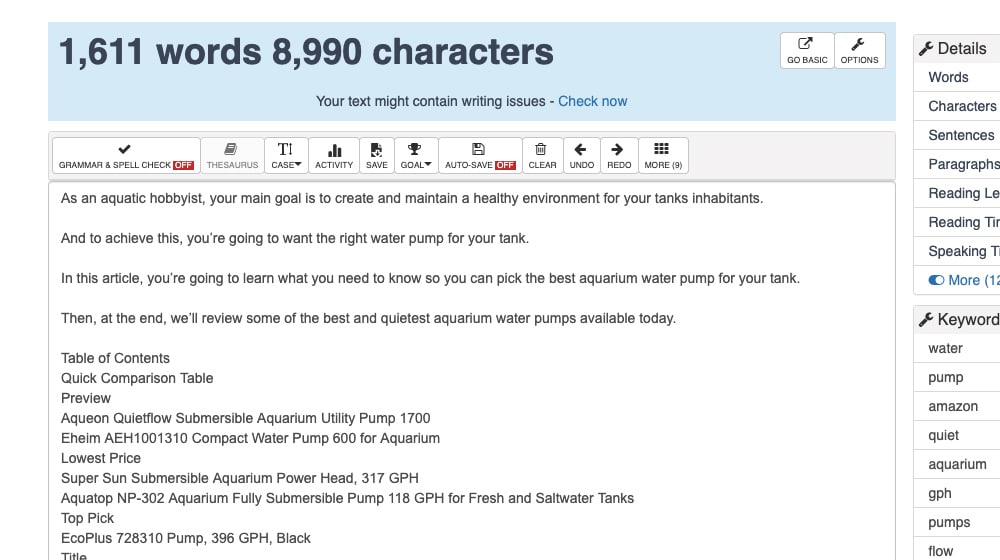
On the other hand, you have a blog and you want to write about "how to choose a web host". That is, to put it bluntly, an extremely competitive topic. Since web hosts all have referral and affiliate programs, a million bloggers have written comparison articles about web hosts hoping to sell and get their commission.
For the post on aquarium pumps, you can probably write a simple blog post about miniature pumps and get it to rank pretty quickly even if you only write about 1,000 words of content. As long as your site is relevant, your content is high-quality, and you aren't running into other problems with manual actions or penalties, you should be able to rank with that article.
On the other hand, if you tried to write 2,000 words about different web hosts and rank for that, you'd be lucky to get in the top 100. Maybe even the top 1,000. There are so many different sites, from small-time blogs to guides on household-name websites like CNet and TechRadar. It's an extremely competitive topic, and all of those competitors have thousands of words of content in their articles. Some of the smaller sites that rank for that topic wrote 5,000 or 7,000-word long posts to compete!
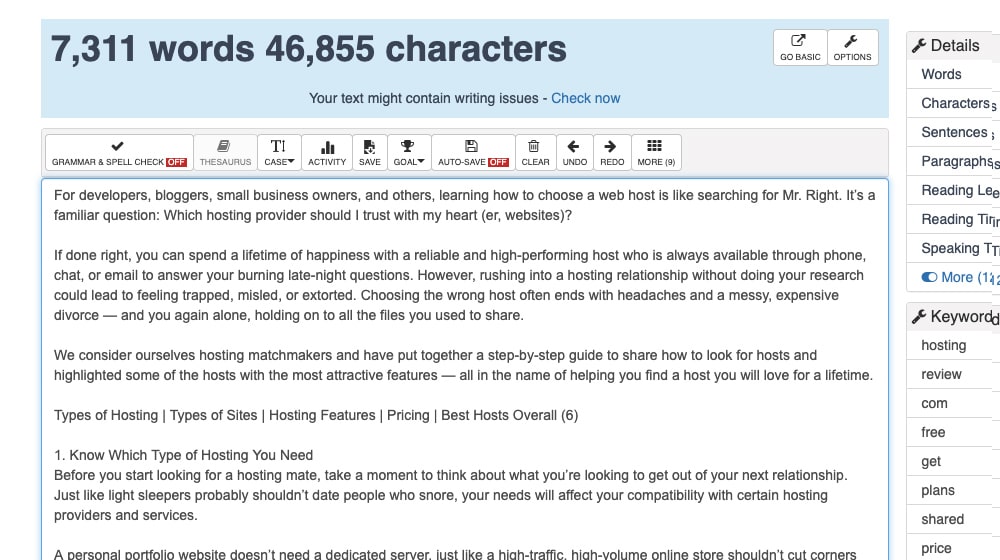
What this all means is that there's no one size fits all solution to word count. If your competition is writing long posts, you need to write long posts to compete. If your competition is nonexistent, you can write whatever you like and rank.
Big sites don't need to put much effort into ranking well, because the weight of their past content and their name recognition carries them a long way. Forbes, for example, has a bit in their writer guidelines that "we find 700 to 800-word posts do best." Forbes doesn't have to worry about competition, because they're going to rank for just about whatever they want to rank for. Google knows who Forbes is - they're a household name registered with Google News and their magazine is over 100 years old.
Research, Guidelines, and Tips
What I've found is that I can compete reasonably well in most niches and for most topics by writing blog posts 2,000-words long. I do this for all of my clients, and all of them have seen at least some level of increased business when it kicks in.
I will say, though, that the foundation of this is rooted in research. I spend a lot of time every week researching ideas for blog posts. I have to find topics that people are looking for on a daily basis with enough popularity to actually have decent search volume and traffic to fight for. Those topics also have to have reasonable enough competition that I have a chance of appearing for that topic.
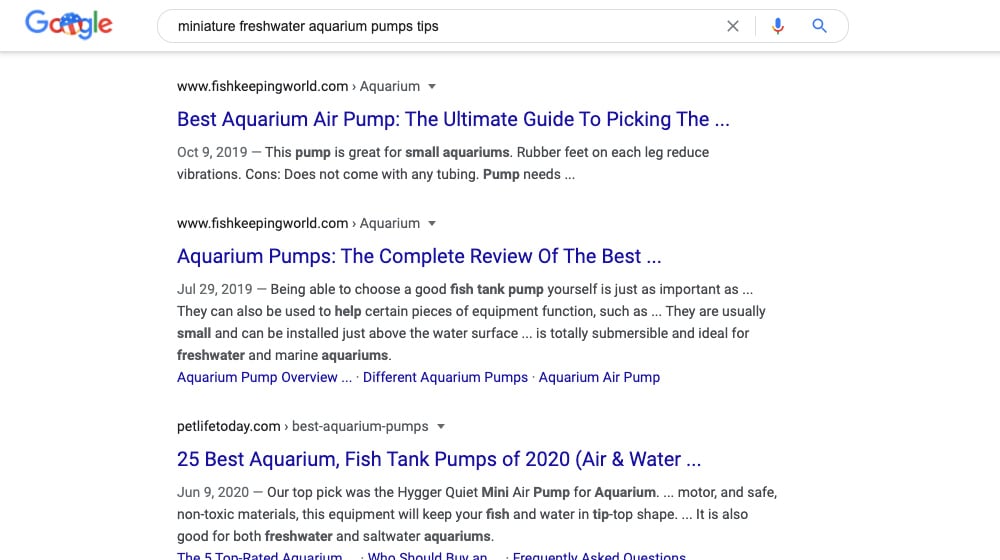
Sure, sometimes posts don't perform as well as you'd like. Sometimes they rank lower on the search results than you'd like. Sometimes you rank #1 on the search results and never budge an inch. That's just the nature of content marketing.
Part of my research when creating content is looking at the content that other sites have created. In addition to looking over the breadth and depth of their coverage, I look for their word count. As with my study up above, I find that, on average, most blogs are only writing 1,000-1,500 words in their posts. By writing 2,000 words, I can out-do them and be in the top percent, even if I'm not #1.
Sometimes you can compete when the competition has longer posts. You need to focus on narrower, more focused content, with deeper value, to do so. If you're writing 2,000 words to compete against a 3,000-word post, you need to make sure the extra 1,000 words you're not writing aren't that valuable.
Diminishing returns are real when you're padding out the length of the post with fluff. I can easily make almost every blog post I write 3,000 words if I add an extra sentence or two to every paragraph that just restates a point or adds an analogy without adding value.
The 10X Method
One of the common blogging strategies out there, popularized by people like Rand Fishkin, is the 10x method. The 10x method is a way of writing blog posts to have 10 times the value of the competition. By creating content ten times better than the content around you, you're guaranteed to stand out and make more of an impact, get more SEO value, draw in more backlinks, and so on.
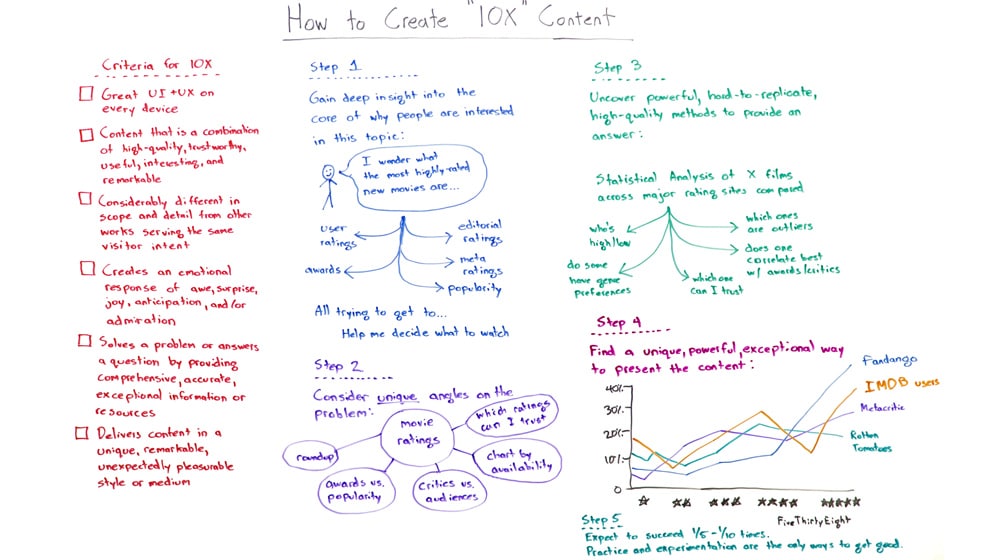
The problem is, a lot of people seem to equate value with length. I blame Google for this, in part; the Panda updates that penalized thin and low-value content did so in a way that made it seem that short content was primarily to blame. After all, how valuable can a blog post be when it's 500 words long? What about 300 words?
Creating "10x content" means putting ten times the value of your competition into a post, but that doesn't mean 10x the length.
- If your competition does a case study with 10 participants, do one with 20.
- If your competition argues a point, take it further and argue the fallout from them being right.
- If your competition is short, yes, make yours longer.
The core of the matter is that more than just the length is important. 10x content needs to have a compelling user experience, a sense of emotional resonance, and plenty of resources to dig deeper into the topic.
What I've found is that 10x content is almost the opposite of what traditional SEO tells you to do. What do I mean?
Years ago, traditional SEO has you spin-off topics and thrive on volume. If you want to write a blog post about aquarium filters, you might spin that off into topics about how to install a filter, how to clean a filter, how to replace a filter, how to find the best filter, and so on. By writing 5-10 different articles, you can cover every possible topic related to the overall keyword.
That's great - until someone comes along and writes one piece of 10x content on aquarium filters, combining all of those into one mega-post with tons of value. That one post has content from all of those different sub-topics and thus will out-perform all of them on their own turf. After all, that post is better written, has more information, is better organized, has better engagement, attracts more links, and does a better job teaching the user something new.
Rather than splitting your ideas, merge them. Write mega-posts. Write 10x content. Just remember that 10x content doesn't necessarily mean 10x the word count. If it did, it would only take a few rounds of competition before we're all struggling to write million-word blog posts, and that doesn't help anyone.
If most of your competitors are already writing 1,500 to 2,000-word blog posts, you're not going to compete very well with a 1,200-word blog post. If you're feeling bold and want to tackle topics with extreme competition, you're going to have to create a diamond to outperform them. Remember to do your research so you know who you're competing with before you write your first word!



 30 Second Summary
30 Second Summary



November 25, 2020
I am used to writing 1000-1500 words per blog post and they've been ranking well until recently. I am not really into writing longer blogs and what I usually do is to separate the topic into different posts. Since you suggested to do a mega-post, do you think its best to just merge my old posts?
November 30, 2020
Hey Harold!
This is a complex question, and it depends on why your posts were ranking well and why they aren't ranking well today.
I would find which keywords they are ranking for with Ahrefs Pro and see which ones dropped over the past year or so.
Then, you can Google those keywords and look at your competition.
Are those posts recent? Are they better than yours? Are they older posts that just moved up in rankings?
What you might benefit from is simply updating each article and adding more content to it. I don't think merging a bunch of articles into a mega-post is the best solution here. I'm not saying it wouldn't work, but since these were ranking, it's possible they became outdated or a competitor simply wrote a better post.
The best solution here is to beef up your posts to improve their performance and value.
April 12, 2021
Woah! Too much useful info! Thank you for sharing this! If I write, for example, a consistent 2k word blog and my competitor has a lower number, you think I have much more edge in the ranking?
April 14, 2021
Hey Evelyn!
Lots of factors to consider other than word count.
Content relevance, quality, the site and authority of your site, your internal linking structure, whether or not your site is well-optimized, the age of the site, the sources you cite, the speed of your site, the images and videos that were used, and so on. There are hundreds of these factors.
In theory, if both sites were identical across all of these factors and written by the same writer, the more in-depth article would most likely overtake the shorter one in time.